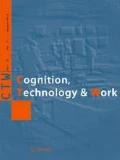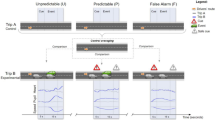Abstract
Previous research has identified cognitive and situational factors as causes of risky driving; however, little is known about what roles cognitive and situational factors have on a specific risky driving behavior. In this study, two simulated drives were conducted to examine the impact of cognitive factors, reflected as working memory capacity and response inhibition capacity, and situational factor, reflected as time pressure, on several risky driving measures. These measures included the percentage of the distance traveled while speeding, the standard deviation of the lateral lane position on curves, safety scores, and accident frequency. Fifty-one participants were recruited by means of monetary rewards. Similar to the results from previous studies, working memory capacity, response inhibition, and time pressure were found to be significantly correlated with risky driving behaviors. Further investigation showed that (1) time pressure, as a situational factor, contributed more to speeding; (2) response inhibition, as a cognitive factor, contributed more to lane-keeping precision; (3) cognitive factors (working memory capacity and response inhibition capacity) and situational factor had almost equal effects on responses to critical events. The results also indicated no significant interaction between cognitive and situational factors on risky driving behaviors. Our findings conclude that the mechanisms behind risky driving behaviors differ, and these results have possible implications for traffic safety interventions.

Similar content being viewed by others
References
Beck KH, Daughters SB, Ali B (2013) Hurried driving: relationship to distress tolerance, driver anger, aggressive and risky driving in college students. Accid Anal Prev 51:51–55. https://doi.org/10.1016/j.aap.2012.10.012
Beilock SL, Carr TH (2005) When high-powered people fail: working memory and “choking under pressure” in math. Psychol Sci 16(2):101–105. https://doi.org/10.1111/j.0956-7976.2005.00789.x
Belling PK, Suss J, Ward P (2015) The effect of time constraint on anticipation, decision making, and option generation in complex and dynamic environments. Cogn Technol Work 17(3):355–366. https://doi.org/10.1007/s10111-015-0334-2
Coeugnet S, Naveteur J, Antoine P (2013) Time pressure and driving: work, emotions and risks. Transp Res Part F Traffic Psychol Behav 20:39–51. https://doi.org/10.1016/j.trf.2013.05.002
Coeugnet S, Forrierre J, Naveteur J, Dubreucq C, Anceaux F (2016) Time pressure and regulations on hospital-in-the-home (HITH) nurses: an on-the-road study. Appl Ergon 54:110–119. https://doi.org/10.1016/j.apergo.2015.11.018
Crone EA, Dahl RE (2012) Understanding adolescence as a period of social-affective engagement and goal flexibility. Nat Rev Neurosci 13(9):636–650. https://doi.org/10.1038/nrn3313
Fillmore MT, Rush CR, Hays L (2006) Acute effects of cocaine in two models of inhibitory control: implications of non-linear dose effects. Addiction 101(9):1323–1332. https://doi.org/10.1111/j.1360-0443.2006.01522.x
Fitzpatrick CD, Samuel S Jr (2017) The use of a driving simulator to determine how time pressures impact driver aggressiveness. Accid Anal Prev 108:131–138. https://doi.org/10.1016/j.aap.2017.08.017
Groeger JA (2013) Understanding driving: Applying cognitive psychology to a complex everyday task. Routledge, London
Hatfield J, Williamson A, Kehoe EJ, Prabhakharan P (2017) An examination of the relationship between measures of impulsivity and risky simulated driving amongst young drivers. Accid Anal Prev 103:37–43. https://doi.org/10.1016/j.aap.2017.03.019
Hatfield J, Williamson A, Kehoe EJ, Lemon J, Arguel A, Prabhakharan P et al (2018) The effects of training impulse control on simulated driving. Accid Anal Prev 119:1–15. https://doi.org/10.1016/j.aap.2018.06.012
Hofmann W, Schmeichel BJ, Baddeley AD (2012) Executive functions and self-regulation. Trends Cognit Sci 16(3):174–180. https://doi.org/10.1016/j.tics.2012.01.006
Ivers R, Senserrick T, Boufous S, Stevenson M, Chen H-Y, Woodward M et al (2009) Novice drivers’ risky driving behavior, risk perception, and crash risk: findings from the drive study. Am J Public Health 99(9):1638–1644. https://doi.org/10.2105/AJPH.2008.150367
Jimmieson NL, Tucker MK, White KM, Liao J, Campbell M, Brain D et al (2016) The role of time pressure and different psychological safety climate referents in the prediction of nurses’ hand hygiene compliance. Saf Sci 82:29–43. https://doi.org/10.1016/j.ssci.2015.08.015
Jongen EMM, Brijs K, Komlos M, Brijs T, Wets G (2011) Inhibitory control and reward predict risky driving in young novice drivers-a simulator study. Soc Behav Sci 20(6):604–612. https://doi.org/10.1016/j.sbspro.2011.08.067
Mäntylä T, Karlsson MJ, Marklund M (2009) Executive control functions in simulated driving. Appl Neuropsychol 16(1):11–18. https://doi.org/10.1080/09084280802644086
Mongillo G, Barak O, Tsodyks M (2008) Synaptic theory of working memory. Science 319(5869):1543–1546. https://doi.org/10.1126/science.1150769
O'Brien F, Gormley M (2013) The contribution of inhibitory deficits to dangerous driving among young people. Accid Anal Prev 51:238–242. https://doi.org/10.1016/j.aap.2012.11.024
O'Brien S, Tay R, Watson BC (2004) Situational factors contributing to the expression of aggression on the roads. IATSS Res 28(1):101–107. https://doi.org/10.1016/S0386-1112(14)60097-2
Peer E (2010) Speeding and the time-saving bias: how drivers’ estimations of time saved in higher speed affects their choice of speed. Accid Anal Prev 42(6):1978–1982. https://doi.org/10.1016/j.apergo.2015.11.018
Peer E (2011) The time-saving bias, speed choices and driving behavior. Transp Res Part F Traffic Psychol Behav 14(6):543–554. https://doi.org/10.1016/j.trf.2011.06.004
Redick TS, Broadway JM, Meier ME, Kuriakose PS, Unsworth N, Kane MJ et al (2012) Measuring working memory capacity with automated complex span tasks. Eur J Psychol Assess 28:164–171. https://doi.org/10.1027/1015-5759/a000123
Rendon-Velez E, Horváth I, Vander Vegte W (2012) A pilot study to investigate time pressure as a surrogate of being in haste. In: Proceedings of the ninth international symposium on tools and methods of competitive engineering, pp 393–406.
Rendon-Velez E, Van Leeuwen PM, Happee R, Horváth I, Vander Vegte WF, De Winter JCF (2016) The effects of time pressure on driver performance and physiological activity: a driving simulator study. Transp Res Part F Traffic Psychol Behav 41:150–169. https://doi.org/10.1016/j.trf.2016.06.013
Rolison JJ, Regev S, Moutari S, Feeney A (2018) What are the factors that contribute to road accidents? An assessment of law enforcement views, ordinary drivers’ opinions, and road accident records. Accid Anal Prev 115:11–24. https://doi.org/10.1016/j.aap.2018.02.025
Rose ME, Huerbin MB, Melick J, Marion DW, Palmer AM, Schiding JK et al (2002) Regulation of interstitial excitatory amino acid concentrations after cortical contusion injury. Brain Res 943(1):15–22. https://doi.org/10.1016/s0006-8993(02)02471-x
Ross V, Jongen E, Brijs T, Ruiter R, Brijs K, Wets G (2015) The relation between cognitive control and risky driving in young novice drivers. Appl Neuropsychol Adult 22(1):61–72. https://doi.org/10.1080/23279095.2013.838958
Schroeder P, Kostyniuk L, Mack M (2011) National Survey of speeding attributes and behaviors (report no. DOT HS 811 865). National Highway Traffic Safety Administration, Washington
Steinberg L (2007) Risk taking in adolescence: New perspectives from brain and behavioral science. Curr Dir Psychol Sci 16(2):55–59. https://doi.org/10.1111/j.1467-8721.2007.00475.x
Steinberg L (2008) A social neuroscience perspective on adolescent risk-taking. Dev Rev 28(1):78–106. https://doi.org/10.1016/j.dr.2007.08.002
Szollos A (2009) Toward a psychology of chronic time pressure: conceptual and methodological review. Time Soc 18(23):332–350. https://doi.org/10.1177/0961463X09337847
Unsworth N, Heitz RP, Schrock JC, Engle RW (2005) An automated version of the operation span task. Behav Res Methods 37(3):498–505. https://doi.org/10.3758/BF03192720
Vanderhaegen F (2016) A rule-based support system for dissonance discovery and control applied to car driving. Expert Syst Appl 65:361–371. https://doi.org/10.1016/j.eswa.2016.08.071
Wåhlberg AE, Dorn L, Kline T (2010) The effect of social desirability on self reported and recorded road traffic accidents. Transp Res Part F Traffic Psychol Behav 13(2):106–114. https://doi.org/10.1016/j.trf.2009.11.004
Wang Z, Shah P (2014) The effect of pressure on high-and low-working-memory students: an elaboration of the choking under pressure hypothesis. Br J Educ Psychol 84(2):226–238. https://doi.org/10.1111/bjep.12027
Weyman A, Clarke D, Cox T (2003) Developing a factor model of coal miners’ attributions on risk-taking at work. Work Stress 17(4):306–320. https://doi.org/10.1080/02678370310001646844
World Health Organization (2018) Global status report on road safety. Geneva. https://www.who.int/violence_injury_prevention/road_safety_status/2018/en/. Accessed 20 June 2019
Zhang Z, Guo Y, Yuan W, Wang C (2019) The impact of cognitive distraction on driver perception response time under different levels of situational urgency. IEEE Access 7:184572–184580. https://doi.org/10.1109/ACCESS.2019.2960830
Zicat E, Bennett JM, Chekaluk E, Batchelor J (2018) Cognitive function and young drivers: The relationship between driving, attitudes, personality and cognition. Transp Res Part F Traffic Psychol Behav 55:341–352. https://doi.org/10.1016/j.trf.2018.03.013
Acknowledgements
This study was funded by Changjiang Scholars and Innovative Research Team in University (Grant number IRT_17R95).
Author information
Authors and Affiliations
Corresponding author
Additional information
Publisher's Note
Springer Nature remains neutral with regard to jurisdictional claims in published maps and institutional affiliations.
Rights and permissions
About this article
Cite this article
Zhang, Z., Guo, Y., Fu, R. et al. Do situational or cognitive factors contribute more to risky driving? A simulated driving study. Cogn Tech Work 22, 759–767 (2020). https://doi.org/10.1007/s10111-020-00630-3
Received:
Accepted:
Published:
Issue Date:
DOI: https://doi.org/10.1007/s10111-020-00630-3




